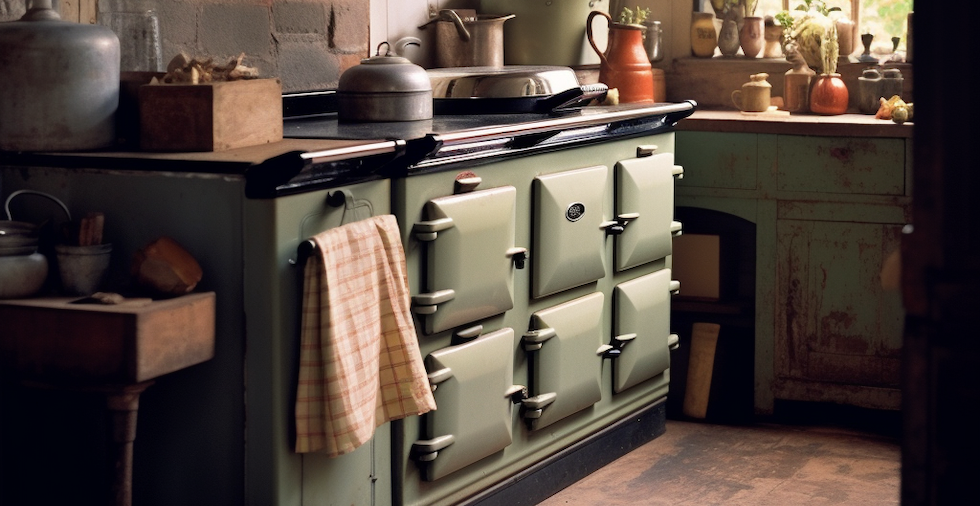Is it time to upgrade your kitchen? If you're looking to overhaul arguably the most crucial room in the house, there's a whole load to consider. But, while there are loads of appliances, the reigning king has to be the Aga. Have you heard of it yet?
If you're out of the loop, you've come to the right place. The Swedish cooker has been around for aeons and has the reputation to prove it. In the following guide, we will look at what an Aga is, a short history of the product, and its countless benefits.
What is an Aga?
An Aga is a range cooker that originated in Sweden in the early 20th century. It was designed to provide a constant home cooking and heating heat source. The ovens are typically made of cast iron and are designed to be left on all the time, which means they are always ready for cooking.
It's a rather innovative system. The kitchen stove uses a system of cast iron ovens heated by a central burner or series of burners. The heat radiates outwards from the Aga ranges, providing a gentle, even heat ideal for slow cooking.
Often seen as a symbol of traditional country living, Aga cookers are popular in the UK. They are known for their durability and long life, and many families have owned Aga stoves for generations. It is essential to note that they come in various sizes and styles to suit different homes and cooking needs.
A Short History of Agas
Want to know more? Let's take things way back to the start. The first Aga cooker was created in 1922 by Gustaf Dalén, a Swedish physicist, who had been blinded in an accident while working with gas. He developed an oven that used radiant heat from cast iron to cook food, and the design was eventually brought to England by a company called Allied Iron Founders.
After working for many years at the Coalbrookdale Iron Works, Cook was inspired to start his own company, where he gained a deep knowledge of cast-iron construction. Then, seeing the potential in an Aga cooker, he began producing his version in 1935, called the "Aga Heat Storage Cooker." He later formed a company in 1935 at Coalbrookdale, Shropshire, specialising in producing and providing the aga service from the gas stove.
Believe it or not, today, Aga cookers are still manufactured in the town of Coalbrookdale, and the brand has expanded to include a wide range of ovens and stoves, kitchen accessories, and cookware. Despite their long history, Agas remains a popular choice for home cooks who value quality, durability, and the ability to create delicious meals.
How does an Aga work?
The basic principle behind how an Aga works is that it stores heat generated by its fuel source in its cast iron structure and then releases that heat slowly over time.
The cast iron ovens and hotplates in an Aga are heated up by the fuel source, which can be wood, coal, oil, natural gas, or electricity. The heat generated by the fuel source is absorbed by the cast iron structure of the Aga, which acts as a heat sink.
The cast iron slowly releases the stored heat into the ovens and hotplates or Aga hot water, which continues to cook even when the fuel source is turned off. The stove has several layers of insulation, which help to keep the heat inside and prevent it from escaping. The Aga central heating and immersion heater is efficient and uses less fuel than other stoves. The heat from an Aga oil burner is also very gentle and evenly distributed, which makes it ideal for cooking a wide range of dishes.
To use an Aga, you simply load the fuel source into the stove, light it, and wait for the cast iron to heat up. Once the cast iron is hot, you can start cooking on the ovens and hotplates. The temperature of the ovens, boiler, and hotplates can be adjusted by opening or closing vents or using a temperature control mechanism, depending on the type of Aga.
How much does an Aga cost?
Let's talk money! As you might expect, these cookers don't come cheap. A new Aga cooker can cost anywhere from £6450 to £16126. Additionally, there may be installation costs and other expenses to consider, such as fuel or electricity to operate the cooker.
The benefits of Agas
If you're forking out all that cash, you need to know that it's worth it. There's a reason (or five!) that Agas are so popular. Here are the benefits you need to know about.
1. Energy efficiency
Agas are highly energy efficient and designed to retain heat for long periods. It means you can Aga cook using less energy and save money on your energy bills.
2. Versatility:
You can use various cooking methods, including baking, roasting, grilling, and simmering with an Aga. They are also ideal for slow cooking and can be left on without monitoring.
3. Comfort
Aga stoves are designed to emit a gentle, radiant heat that warms the area. It can make your kitchen an inviting place to spend time, especially during colder months.
4. Durability
Durability is the name of the game. These are cookers that will stand the test of time. Agas are built to last, with sturdy construction and high-quality materials.
5. Aesthetic appeal
Let's not forget that Agas look classic and cool. They have a timeless design that can enhance the aesthetic appeal of your kitchen.
The main Aga ranges, explained
Are you thinking about getting an Aga? If so, you will want to know about the different ranges. Here's a quick breakdown of the main ones:
1. Aga Total Control
This stove range offers the classic Aga look and cooking style but with the added flexibility of turning the ovens on and off individually and controlling the hotplates using a touch-screen panel.
2. AGA City60
It is a smaller version of the classic Aga and is designed to fit into smaller kitchens. It offers two hotplates and a single oven but retains the same cooking performance and iconic style as the larger Aga ranges.
3. Aga Six-Four
This range offers six gas burners and four ovens, making it ideal for larger families or those who love entertaining. It also comes in various colours and designs to suit different kitchen styles, such as the island kitchen layout.
4. Aga Masterchef XL
This range is designed for serious cooks and features a robust gas hob and two sizeable electric aga ovens. It also comes with a separate grill and offers precise temperature control for perfect results every time.
5. Aga Module:
It offers flexibility and customisation, allowing you to create your cooking range using a combination of Aga modules, including gas hobs, induction hobs, and oil-fired Aga ovens.
Bonus: Rayburn Cookers
They are cast-iron heat-storage appliances, similar to Agas, since they can heat water. One significant difference is that a Rayburn may be used as a cooker, hot water boiler, and central heating system.
There's a long history here! The Aga cooker is a high-end, premium cooking appliance that has been around for over 90 years. It is a versatile baking, roasting, grilling, and simmering device. The cooker is also suitable for those who prioritise high-quality cooking and are willing to invest in a long-lasting and efficient appliance.
Q&A
Want to know more about the Aga kitchen stove? We've got you covered. Here are some answers to the frequently asked questions.
What is the point of an Aga?
An Aga cooker may be expensive, but it has been a staple of British kitchens for decades. The stove is always on, provides ambient heat, and gives the space a classic look.
Are Aga stoves gas or electric?
Aga stoves mainly run on gas. When you are considering whether to get an Aga, you need to keep this in mind. It is worth doing your research ahead of choosing the right cooker.
Does an Aga heat the house?
An Aga cooker is always on and provides a level of ambient heat. While it won't heat the entire home, it does mean that your kitchen area will be toasty.
Is cooking with an Aga different?
You can use an Aga the same way you would any cooker. However, you don't need to wait for the oven to preheat when baking things. That is good news when you're in a rush!
What do you think of Aga cookers? Let us know in the comments below!


Leave a Reply